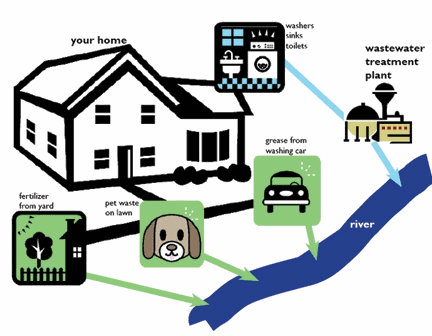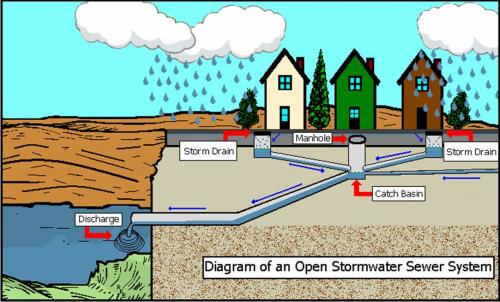Stormwater Information *UPDATED*
Stormwater Pollution Prevention
 What is stormwater?
What is stormwater?
It is simply any water that comes in contact with or collects on the ground. Stormwater includes rain water runoff, snow melt, or other waters that flow to streams, wetlands and other waterbodies such as our reservoirs.
What's the problem?
As it flows, stormwater runoff collects and transports animal waste, litter, salt, pesticides, fertilizers, oil & grease, soil, and other potential pollutants. Rain and snowmelt wash pollutants from streets, construction sites, and land into storm sewers and ditches. Eventually, these empty the polluted stormwater directly into streams and rivers with no treatment. This is known as stormwater pollution.
Toxic substances from motor vehicles and careless application of pesticides and fertilizers threaten water quality and can kill fish and other aquatic life. Bacteria from animal wastes and improper connections to storm sewer systems can make lakes and waterways unsafe for wading, swimming and fish consumption. Eroded soil is a pollutant as well. It clouds the waterway and interferes with the habitat of fish and plant life.
Are sanitary sewer systems and a storm sewer systems are the same? NO. Water that goes down a sink or other inside drain flows to either a wastewater treatment plant or to a septic system for treatment. Storm sewer flows are not treated. Water that flows down driveways, streets, and outside areas into a storm sewer or ditch flows directly to nearby creeks, fish and wildlife habitats, downstream recreational areas, and drinking water supplies.
There are many types of pollutants that find their way into storm drains.
 Some common pollutants found in storm sewers and creeks include
Some common pollutants found in storm sewers and creeks include
- Animal waste
- Litter
- Motor oil
- Yard clippings
- Fertilizers and pesticides
- Soapy car wash water
- Eroded sediment from construction projects
It's important to remember that any type of surface water runoff, not just rainfall, can run into the storm sewer and collect in the stormwater management system. For example, when you wash your car on the driveway, that water, dirt, and grime ends up in the system. That's why we need to be careful with what we put into the storm sewers as traces of all this material can end up in the stormwater system and our local waterways.
Spills & Violations
Please contact the Bellingham DPW @508-966-5813 if you are aware of any spills or violations.
10/3/23

